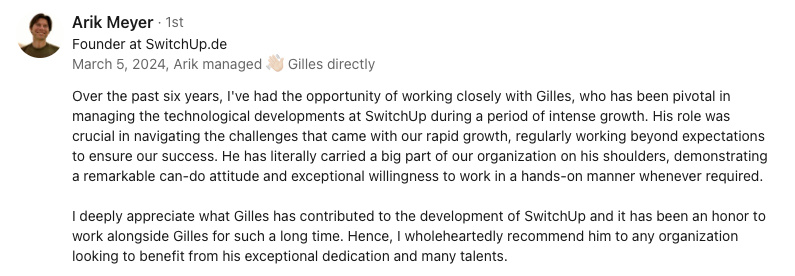Abstract:
The article discusses the transformative impact of quantum computing on the fintech industry, highlighting its potential to revolutionize financial modeling, risk analysis, and fraud detection. Quantum computing's advanced capabilities offer fintech companies opportunities to enhance efficiency, accuracy, and security, setting new industry standards. However, the adoption of this technology also presents challenges, particularly in adapting to and integrating these innovations effectively. The article emphasizes the importance of strategic planning and the creation of quantum-ready teams to navigate these challenges. Furthermore, it touches on the regulatory landscape, particularly in Europe, where quantum technologies can aid in compliance with complex regulations like GDPR by providing robust data protection solutions. European fintech startups are leading in quantum adoption, using it as a tool for gaining a competitive edge globally by attracting investments and expanding market reach. The narrative includes examples of companies like Sandbox AQ and Quantum Machines, showcasing how early adoption of quantum solutions can lead to operational advantages and market distinction. Ultimately, the article underscores that quantum computing is not just a technological upgrade but a pivotal force poised to reshape the financial landscape, urging fintech firms to prepare strategically for this quantum future.
In finance, change is constant, and a significant shift is on the horizon. Quantum computing, once a staple of science fiction, is now transforming the fintech industry. This technology has the potential to simplify financial modeling, risk analysis, and fraud detection. For fintech companies, this is not merely about keeping pace; it’s about gaining a competitive edge. However, with its great potential comes the challenge of adaptation. How can these companies harness this power to enhance efficiency, accuracy, and security? Let’s explore how quantum computing is reshaping fintech and what it signifies for the future.
Quantum computing's impact on fintech
Quantum computing is revolutionizing fintech by improving financial modeling, enhancing risk analysis, and advancing fraud detection. This transformation is not about minor enhancements; it's about redefining how financial institutions operate to become more efficient, accurate, and secure.
Transforming financial modeling
Quantum computing is poised to enhance financial modeling, particularly in portfolio optimization and Monte Carlo simulations.
In portfolio optimization, quantum computing provides superior computational capabilities compared to classical algorithms, enabling the handling of complex financial calculations. This allows finance professionals to allocate assets more effectively, resulting in better returns and improved risk management. Quantum algorithms enable financial institutions to find solutions that are both efficient and precise, setting a new benchmark.
Quantum algorithms also accelerate Monte Carlo simulations, which are crucial for financial forecasts. By speeding up these simulations, quantum computing ensures forecasts are accurate and timely, which is essential for strategic decisions. This increased speed helps planners and analysts predict future market conditions more reliably, improving upon traditional models.
Enhancing risk analysis
Quantum computing is refining risk management processes by handling large datasets with precision.
Its ability to process vast amounts of data efficiently leads to more accurate risk assessments. This accuracy is crucial for minimizing financial risks and safeguarding operations against uncertainties. With improved accuracy, institutions can anticipate potential threats and adjust proactively. In credit risk, quantum algorithms refine models, allowing for swift and informed decisions. These advancements mean models can quickly adapt to market changes, providing banks with real-time insights, reducing defaults, and enhancing financial stability.
Navigating European fintech regulations
Regulatory challenges in fintech
European fintech startups face the challenge of navigating complex regulations, which demand rigorous compliance strategies. The regulatory environment is intricate, requiring fintech companies to focus on legal and operational frameworks to avoid penalties. A key regulation is the General Data Protection Regulation (GDPR), which impacts how data is handled. This regulation necessitates strict data privacy and security guidelines, compelling fintech startups to develop comprehensive compliance strategies.
Navigating GDPR is not merely a legal formality; it's a strategic move. Complying protects companies from legal issues and enhances consumer trust. Strong data protection under GDPR positions firms as responsible, offering a competitive advantage. Quantum technologies provide innovative compliance solutions that streamline these processes, enhancing data security and helping meet GDPR requirements.
Quantum computing as a compliance tool
Quantum computing serves as a promising ally for compliance and data security. It enables the development of quantum-resistant algorithms, providing fintech firms with robust methods to safeguard information from cryptographic threats. With quantum computing, these algorithms are crucial for secure data handling, future-proofing fintech firms against breaches.
- Quantum technologies align with evolving global regulations, including those in Europe.
- For fintech companies, integrating quantum solutions into compliance strategies ensures adherence to regulations and strengthens data security.
- This dual benefit makes quantum computing invaluable for fintech companies aiming to streamline their regulatory frameworks. Some European fintech startups are already adopting these technologies, discovering how strategic implementation can meet regulatory demands efficiently.
Leading in quantum adoption
Pioneering quantum initiatives
European fintech startups are at the forefront of integrating quantum computing, seeking a competitive edge. Companies like Sandbox AQ and Quantum Machines are early adopters, pushing boundaries. Their interest in quantum computing stems from solving complex problems more efficiently than traditional methods. This adoption provides them with operational advantages and distinguishes them in the market.
By embracing quantum technologies, these pioneers set new benchmarks in innovation and efficiency, inspiring the broader fintech community. Their strategic use of quantum solutions positions them as industry leaders, showcasing the transformative potential of these technologies. This creates a ripple effect, encouraging other firms to explore similar advancements. These trailblazers pave the way for more widespread adoption, turning quantum technologies from aspiration to reality.
Strategic outcomes and lessons
For these early adopters, quantum computing has led to improved data processing and decision-making efficiency. Using quantum algorithms, startups process vast data amounts faster and more accurately. This efficiency translates into business growth, offering a template for others seeking similar benefits.
The experiences of these pioneering firms provide valuable lessons. With improved data processing leading to better decisions, they highlight strategic advantages others can leverage. The case studies reveal the potential global impact of integrating quantum technologies. Reflecting on these successes helps firms plan their strategic use of advanced technologies.
Capitalizing on Quantum Computing Globally
Gaining a global edge
European fintech firms are at a pivotal moment where quantum computing can enhance their global competitiveness. Quantum technologies boost efficiency far beyond traditional methods, providing an edge over global counterparts. Quantum computing’s processing capabilities enable tasks like portfolio optimization and fraud detection to be faster and more accurate, allowing for swift and decisive action. This advantage attracts investments and expands market reach, positioning European fintech as global players.
Innovation driven by quantum technologies secures funding and opens markets. Investors are drawn to companies using cutting-edge technologies because they offer substantial returns and reduced risk. Quantum computing elevates these firms in technological innovation, making them appealing to venture capitalists and financial institutions. Innovation keeps European fintech competitive and ensures growth in the global marketplace.
Importance of innovation
Innovation allows fintech companies to stand out and seize new market opportunities. Staying on the cutting edge of technology is essential. Quantum computing is a powerful catalyst for innovation, providing tools for novel solutions and services to meet customer needs. This pursuit ensures fintech firms remain competitive and lead peers in transformative products.
Leveraging quantum technologies, fintech firms can pioneer solutions that boost customer satisfaction and expand market share. Advanced quantum algorithms enable sophisticated financial products, offering tailored solutions traditional technology can't match. These advancements position fintech firms as leaders in technology-driven services, attracting more users and fostering loyalty.
Strategic planning and integration
Integrating quantum technologies
Starting with pilot projects is a smart approach for fintech firms to explore quantum computing without large investments. These projects, focusing on fraud detection and portfolio optimization, help assess benefits and challenges. Collaborating with technology firms accelerates quantum initiatives, assisting in testing applications and refining strategies before a broader roll-out.
Partnerships are crucial. Collaborating with quantum technology firms provides fintech firms with expertise and resources for successful integration. Partnerships facilitate knowledge transfer and support, ensuring smoother adoption. Building effective collaborations helps navigate challenges, turning quantum computing from a buzzword into a practical tool enhancing operations.
Building quantum-ready teams
Creating teams for quantum initiatives requires a mix of talents, including expertise in quantum algorithms, data science, and cryptography. Fintech firms must ensure teams are well-rounded to handle complex tasks. A diverse skill set ensures readiness for current and future challenges.
A holistic team-building approach fosters resilience in navigating the fast-evolving quantum landscape. Diverse skills and perspectives keep firms agile and adaptable, ready for quantum opportunities. Having a versatile team provides flexibility to adapt to market and technology changes. Assembling these dynamic teams is crucial, as they become the backbone for harnessing quantum computing's full potential.
Speculating on the Future of Quantum Computing in Fintech
Future trends and technology maturation
As quantum computing matures, it promises significant advancements in computational efficiency and security, offering new opportunities for fintech. Firms can solve complex calculations quickly, enabling real-time decision-making and risk assessment. This maturity is set to redefine fintech, making processes more intuitive and secure. Strategic foresight and investment are crucial for embracing these changes. Fintech firms must plan now to harness technological enhancements, ensuring they are ready to leverage quantum computing as it becomes more accessible.
Adapting to technological shifts is about staying ahead. As quantum technologies evolve, fintech firms must be ready to pivot and adapt to maintain a competitive edge. This proactive approach is essential for navigating the dynamic market landscape. By embracing change and planning strategically, companies can safeguard their future, ready to handle challenges and capitalize on quantum computing opportunities.
Preparing for the quantum future
Investing in quantum-ready infrastructure is a priority for fintech firms aiming for seamless transitions between classical and quantum systems. This involves upgrading technology and developing a strategic roadmap. Investments pave the way for success, ensuring firms can integrate quantum solutions efficiently. By solidifying foundations, fintech companies ensure a smoother journey to future innovations.
Staying informed is half the battle; proactive preparation is where the real advantage lies. By keeping abreast of quantum technology developments, fintech companies can strategically position themselves to harness advancements, driving innovation and growth. Strategic engagement transforms potential into performance, as fintechs tap into quantum's transformative power to foster innovation, enhance services, and expand market positions. Integrating quantum technologies represents not just a technological upgrade but a pivotal step towards reshaping the financial landscape.
Quantum computing is more than a buzzword; it's a game-changer for fintech. By improving financial modeling, risk analysis, and fraud detection, this technology sets a new standard for efficiency and precision. Institutions embracing these innovations are set to leap ahead, ensuring more secure and accurate operations. Moreover, navigating complex regulations becomes more straightforward with quantum technologies, giving fintech firms an edge in compliance and data protection.
Looking forward, integrating quantum computing into fintech is not just about technological upgrades but about reshaping the industry. The opportunity to lead this transformation is there for those ready to adapt and innovate. How will quantum computing impact your world?
You might be interested by these articles:
- Quantum Computing Unveiled
- Exploring Quantum Computing's Future
- Unlocking Quantum Computing's Potential





